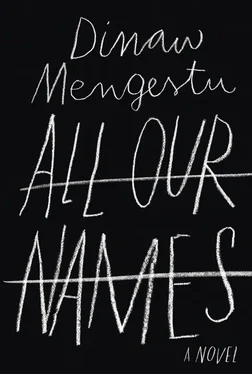• • •
Joseph had multiple offices throughout the house, and each one served a different purpose. He spoke to his guards in one room; he worked quietly alone in another. He left us for one on the ground floor, with instructions to wait in the living room or in the courtyard. We opted for the courtyard; we wanted to see who was going to come to the house that day. Isaac predicted more dignitaries — ministers, businessmen.
“He has many powerful friends who will support him now,” he said.
We stood under our tree and waited for the procession to begin again; a half-hour later, we sat down. Noon came and went, and still not a single car had come to the house. The guards paced around the door and the roof; the maids hung sheets to dry behind the house. One and then two hours passed. It was too hot to sit outside, but Isaac insisted we stay where we were. “Something will happen,” he said, and he was right. Minutes later, one of the guards who rarely left Joseph’s side approached us. We both stood up as soon as we saw him. We couldn’t see most of his face because of the large sunglasses he always wore, even inside the house, but I suspected that seeing us stand at attention, not out of respect but fear, pleased him.
He spoke to Isaac; when he finished, he handed him an envelope and made his way straight back to the house. I knew the envelope was for me by the way Isaac held it. He was hesitant to hand it over, but I wanted him to know that what happened to me next was no longer up to him to decide.
“It’s fine,” I told him.
He gave me the envelope.
“Joseph wants you to learn it,” he said.
The “it” was an intricately hand-drawn map of a section of the capital I had never been in before. The dozens of narrow winding paths suggested a slum similar to the one Isaac and I had lived in, but several times larger.
“And then what?”
“I don’t know,” he said. “But you don’t have long. It’ll be dark in a few hours.”
I was given a room on the second floor to study in. It was empty except for a thin, narrow mattress pressed underneath the window. I looked outside; there was an obstructed view onto the one road that led to the house. I knelt down on the mattress and, with my finger for a gun, pretended to take aim at the invaders coming for us.
It took what was left of the afternoon for me to memorize the map. There were thirty-four different paths, and a dozen smaller offshoots that abruptly ended. I memorized them by imagining myself walking along each one, and when I had walked them all once, I returned to them a second, and then a third time. But now I wasn’t just walking the streets; I was living among them. I invented a second life for those roads. There was a street where my girlfriend lived, another that I walked down every Friday afternoon on my way home from work. I had family members — brothers, aunts, grandparents — that I visited regularly, scattered throughout the neighborhood. By the time Isaac came to tell me Joseph was waiting downstairs, I could close my eyes and see not only the map but the faces and the interiors of the lives and homes that I had made up.
Joseph’s explanation of what he wanted me to do was kept to as few words as possible. I preferred it that way. He asked if I had memorized the map. I told him I knew it by heart. He took the map from me and said he hoped that was true. “You can’t look lost,” he said. “You have to look like you belong.” I assured him that I wouldn’t look lost, that I knew those streets as well as anyone who lived there. He told me he needed me to make a delivery. “We have things here in this house,” he said, “that need to be moved.” A car would be coming soon to bring me to the outskirts of the neighborhood. After that, I would have to go on foot, disguised as a fruit vendor. A wheelbarrow had been prepared. All I had to do was bring it to a particular house before sunset and the curfew went into effect. I would have to wait until the next morning to return.
When he finished, he asked if I was certain I wanted to do this. “It is your decision,” he said.
I was confident I had nothing to lose. I was tired of being aimless.
“I’m positive,” I told him.
The car arrived exactly when Joseph said it would: “It’ll be here in ten minutes,” he told me, and ten minutes later, a heavily dented and mud-stained white pickup truck was pulling into the courtyard. There wasn’t much time left before sunset, and so we moved quickly. Joseph spoke to the driver; the wheelbarrow and its contents were loaded into the back, and I followed behind them. We were ready to leave after a few minutes, and would have done so had Isaac not insisted on coming along. He came to the truck bed, where I was sitting, and had begun to climb in when Joseph shouted at him to stop. Isaac stood on the bumper longer than I expected, and it’s possible he might have even joined me had one of the guards not pulled him off. As soon as he was down, the car reversed quickly out the gates and onto the road, and the last image I had of Isaac was of him standing with his head bent in front of Joseph.
The first five minutes were a difficult ride. I was almost thrown from the bed of the truck twice as we jostled our way along narrow back roads until we were far enough from the house to turn safely onto one of the main avenues. Traffic was light at that hour; as we picked up speed, I relaxed my grip on the rails and inhaled the warm air. We stopped at the traffic circle on Independence Boulevard just long enough for me to jump out and unload the wheelbarrow. There was less than a half-hour before the curfew went into effect, and the sidewalks and streets were crowded with people either rushing home or standing idle on the corners before being forced indoors. I slipped into that mass undetected. It was better than I expected. I knew exactly where I was, almost as if I were home.
I wound my wheelbarrow through the dirty, rutted narrow paths where my imaginary friends and cousins lived. The neighborhood was exactly how I had pictured it — all brown and gray, with every function of life, from the shit in the latrines to the sleep, sex, and fights of the bedroom, squeezed together. Loud voices and strong smells rose from every corner. When I came upon the house marked on the map — a single-story concrete home, identical to the ones next to it except for a faded Bob Marley poster in the window — I felt disappointed that I didn’t have an excuse to keep walking longer.
As soon as I stopped in front of the house, the door opened. Several pairs of hands reached through and grabbed me by the neck and arms. I knew better than to shout, but I still tried to fight my way free. I swung my arms and legs; a powerful forearm wrapped itself around my neck and squeezed; another took hold of my legs and lifted me off the ground. I looked for the wheelbarrow, but it was already gone. That was how I knew I was in the right house.
I was carried into a room in the back. There were bunk beds lined against the wall, and a cot in the middle, but I was dropped on the floor. I was knocked unconscious. When I came to, I saw that I wasn’t alone in the room. There were seven other boys in there, all of whom looked to be teenagers. Four were sitting on the bottom beds, while the other three sat in the corner and smoked. There was no window and only one dim light in the corner, so the room was rich with smoke thick enough almost to mask the other odors. One boy pointed to a cut above my brow, which had begun to bleed. He said something in a language I had never heard, and when I responded in English that I didn’t understand, everyone laughed. I stood up. I turned to the door; poor homes rarely had locks, and my plan was to run as quickly as possible out into the street and find a place to hide. I never made it to the handle. All seven boys pulled at me, and when I was down, two stood in front of the door. They were as kind as they could be about it. They shook their heads and said no many times over, as if they were scolding a young child or a pet that didn’t know its boundaries. I wasn’t allowed to stand up again. I was given a bottom bunk in the corner. The walls were thin — on the other side, I could hear older voices shouting. I wanted to believe only the best outcomes were possible. I tried not to think of dying, but that, of course, was the easiest way of ensuring that it was all I could think about. There were occasional pauses in the shouting, signs that a conclusion was near. I closed my eyes and prayed that the door wouldn’t open until dawn. When it did, ten minutes or maybe an hour later, my eyes were still closed, but I knew it was Isaac’s voice telling me to stand. “We need to leave quickly,” he said.
Читать дальше












